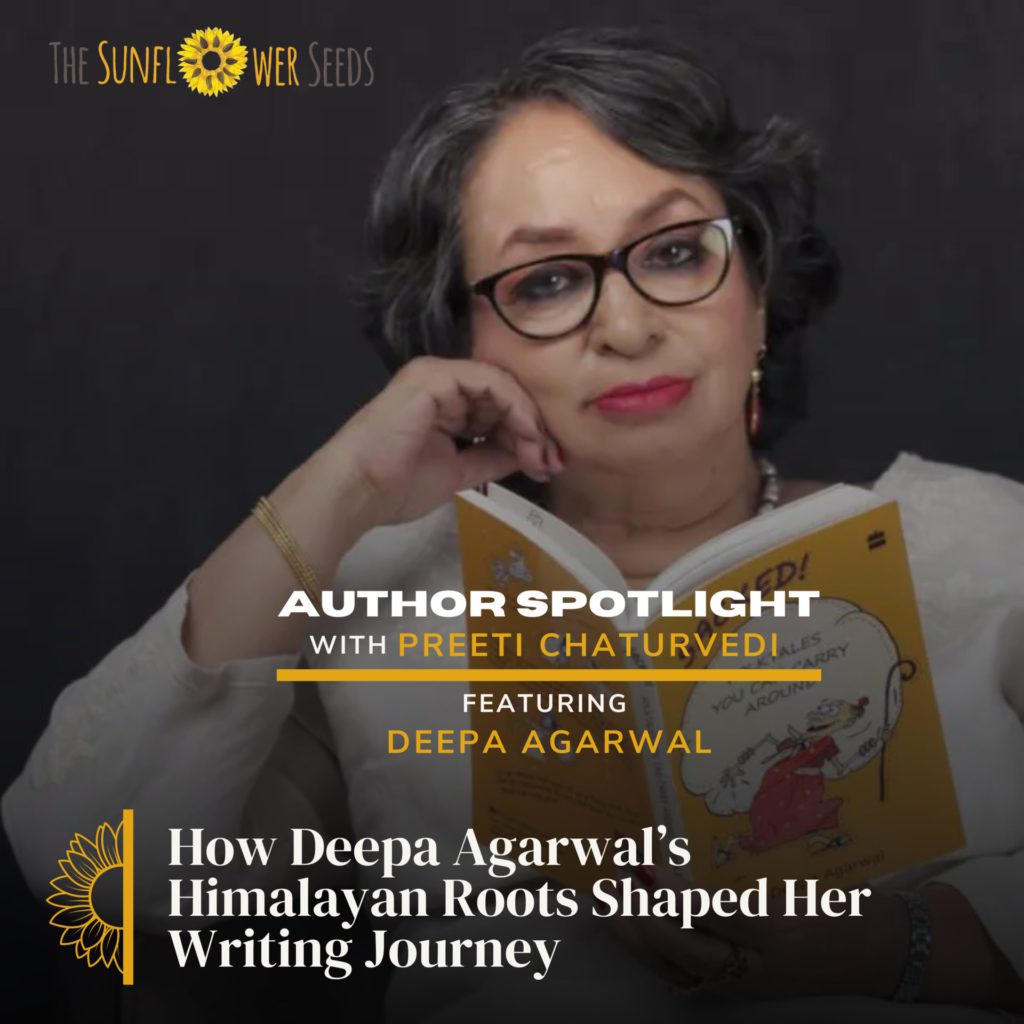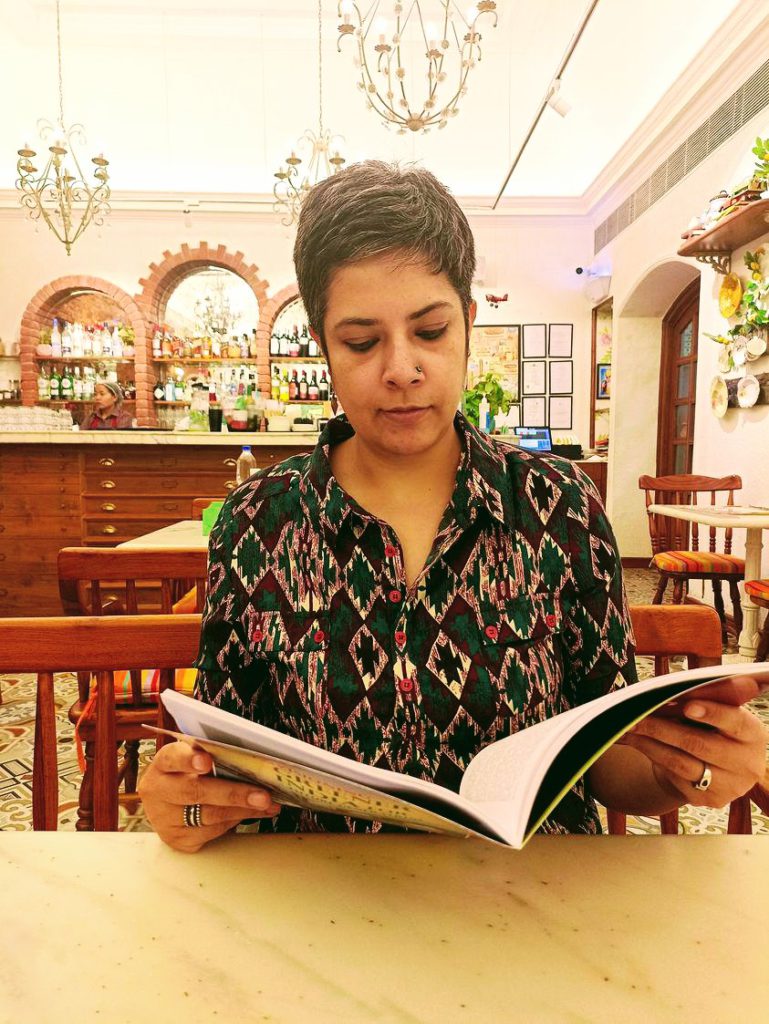Vibha Batra is a multi-talented writer- she does novels, poetry, travel writing, translation, plays and lyrics! It’s a wonder she found time to do an interview with us.
In this interview, we look at her primarily as a novelist- it is Author’s Corner after all!
She has written books for all ages, from Children’s books to Young Adult Novels to Adult books.
She has managed to keep her books engaging and timely, keeping up with contemporary issues of all those age groups and highlighting them in her writing. All her books have the unique voice of their protagonist and that’s one of the main reasons her books are so entertaining.
She shares some of the secrets of her success in a fascinating interview:
Who inspired you to become a writer?
So initially all I wanted to do was eat. But my grandpa, my maternal grandfather, he was a prolific writer and a poet. He somehow believed that I could write because I used to tell stories to my cousins and I used to scribble stuff in my free time, which I had a lot of.
He was very fond of reciting poetry- usually Hindi poetry or Urdu. So one day he started reciting and paused. So I was sitting near him and I said the words I thought would be the right way to end it. He was surprised, convinced he’d recited those words in front of me before. Since that day he’s believed I have a poet in me and I have to write. Although he lived in the same city, he would say, “Write letters to me, tell me how your week was,” and he encouraged me and my sibling to start journaling, that’s where I started.
And once I started reading, I mean, I could not just read and not write because, you know, there’s such beauty in words, at least for me, that you know you want to recapture, recreate some of that beauty on your own.
That’s beautiful. And that was such a clever way of him to encourage you to write. How did you go from that to being a published author? How did you first get published?
OK, so then I started working in advertising. I was a copywriter, I still am. So I’m going to go to the great copy desk in the sky!
But then my grandpa passed and you know, we were very devastated because he was just a towering presence in our lives. So one fine day I just declared I was going to translate his book on the Ishaavaasya Upanishad from Hindi and Sanskrit to English. Everyone suggested maybe I should just start with one of his simpler books, a memoir or a travelogue. So I said no, but this is my favourite book.
I started that and I was working full time and I was translating a book and it was so difficult and you know, I dropped the ball so many times. But then I just did what the self-help books tell us to do. I announced my goal to the whole entire world. So then every time I would just sit and twiddle my thumbs, my colleagues would walk up to me and say why are you sitting free twiddling your thumbs? Don’t you have a book to translate? So I would just get back on the bandwagon. So that took me a couple of years. And then the book was published by Rupa and that’s how my journey started.
OK, but from translating someone else’s work to having such a strong voice yourself, you really came a long way. Every single character of your house has such a strong personality and a distinct voice as well. How do you work on that? How do you come up with them and their stories?
The thing is, I don’t know. And in fact, I’m sure a lot of people agree with that because I was watching Neil Gaiman’s interview and he said, “When people ask that question, authors get really mean because they don’t know the answer,” So just…these characters just stroll into my head. It could be, a scene that I see in my head or something that I read and, you know, then, you know, I have this dire need to just, you know, capture it on paper.
OK, but they all seem to come from different backgrounds as well. So how do you research those backgrounds? Some are Punjabi, some are South Indian. So all of them have different backgrounds and you show what their family life is like and how each is different from each other. Do you get inspired by your friends or do you do research?
Yes, life, books, music, people I meet. I just like to draw from every experience and somehow it just comes together OK.
Yeah, what is the main difference between writing for kids, writing for young adults, and writing for adults? Could you give tips to future writers on how to write differently for all of them?
OK, so I just have one tip and the tip is read, read, read as much as you can. You cannot be a writer unless you read. So that’s my only tip.
A second tip would be just keep at it because it’s really hard. It’s a solitary job and so many times, you just feel like, “oh God, it’s just not going anywhere!,” “That’s not good enough”, “Maybe I should just stop”, but I think there’s a lot of honour in completing what you start. So just stay on track. Just motivate ourselves and just keep at it, you know, I’m sure the end result is going to be really beautiful. That’s what I like to tell myself.
And the second question, what’s the difference? So when I was working on my Dinky trilogy with Penguin Random House, my editor said, “Oh my God, in one page alone. You’ve written the “sh” word over at least 100 times, and it’s for young adults.” So I realised maybe I should just substitute these words with safer alternatives. So that “Sh” word became “shoot” and “Shut the front door” and “What a basket”, you know, words like that. But you have free rein in writing for adults.
Then it’s just the matter of, you know, finding the subjects that would be relevant for young adults as opposed to adults. But you know what? I’ve found that some common themes are parental interference- you can be a young adult, you can be an adult, you can be a middle-aged person and that never stops. And yeah, even bullies- you can have bullies as a child, as a teenager, office bullies, well-meaning relatives could play that part too.
You write on contemporary issues really well. School issues, like that same Rinky series that was in 2012 and the newest one, the one with Arya that’s in the Instagram era. How do you keep up with all the contemporary issues that teenagers are going through?
OK, so I have a confession. I think of myself as a young adult. Initially, I used to know I’m 16, then I thought, you know, most days that’s not true because some days I’m 10. So you know I’m just writing for the 10-year-old in me. For instance, Kolam Kanna was for the 10-year-old in me and Drinky and Arya, they were for the 16-year-old in me.
Then You’re not writing about someone else. You’re just writing.
Yeah, because then it won’t ring true.
You know, the sense of audience, somebody, watching over my back and the sense that I have to try and please someone won’t work. I already do a lot of that in advertising because you’re writing to a brief. So when I’m writing books, I want to write for myself.
How would you stay in touch with what issues they might be going through? Is it through family? Friends? Friends kids?
Yes, absolutely. You know, just being engaged with the world, reading a lot, reading the papers, reading books, reading back of back of shampoo bottles, everything. Don’t spare anything.
You write both male and female characters and you highlight the sexism both of them face, which is so good. You also bring up other issues like talking English with an accent and how people are discriminated for all kinds of things. What do you hope that parents and kids are gonna take away from these stories?
OK, My only hope is you know that it’s a good story well told. So if I’ve done that I think I’m home. You can’t just beat them into buying your message. But I just find that whatever point you’re trying to make, whatever story you’re trying to tell, if you coat it in humor, I think it just hits home.
Because no one wants to be preached to, you know. If anyone starts preaching to me, I just tune out. I’m like, “oh, God, OK. I don’t need more unsolicited advice.” So, you know, my only goal is to write a good story and to tell it well to the best of my ability. That’s all.
So any tips for not being preachy and writing while getting good messages across?
Maybe not be preachy in real life. Just practice being non-judgmental.
Is there any genre you are interested in and want to get into writing but haven’t written yet?
OK, so I’ve written a lot of horror shorts. But I haven’t really written a horror novel, so I really want to. But I’m so scared. I’m a total scaredy cat. And you know, hats off to those who write horror novels or watch horror movies and make solo trips to the loo.
But Dar ke Aage jeet hai, so I wanna try and do that.
A horror novel for children or for adults?
Oh my gosh, I mean both sound equally scary but I guess both.
OK. And what are you working on right now and what can we look forward to seeing from your book 25?
OK, yes, so I have a picture book coming out soon. It’s being published by Karadi Tales and I’m really excited.





